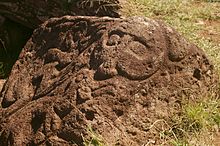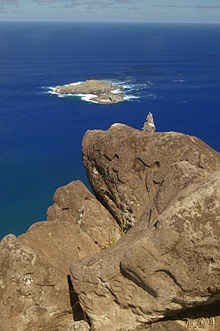
Makemake (also written as Make-make; pronounced [ˈmakeˈmake] in Rapa Nui) in the Rapa Nui mythology of Easter Island is the creator of humanity, the god of fertility and the chief god of the "Tangata manu" or bird-man sect (this sect succeeded the island's more famous Moai era). He appeared to be the local form, or name, of the old Polynesian god Tane. He had no wife.
Makemake, as a face with large eyes or perhaps a skull with large eye sockets and a phallic nose, is a frequent subject of the Rapa Nui petroglyphs.
The Birdman sect
Métraux states that Easter Island's "greatest religious festival, the only one concerning which circumstantial details survive, was that of the bird-man, intimately linked with the cult of the god Makemake."
Makemake drove the birds to nest on the islet of Motu Nui ('big islet'), the center of the tangata-manu (bird-man) sect. Four gods were associated with it: Makemake, Haua-tuꞌu-take-take ('Chief of the eggs', usually simply called 'Haua'), vîꞌe Hoa (Haua's wife) and vîꞌe Kenatea. Each of the four gods had a supernatural servant, whose "names were given" in the ceremonies.
The ivi atua was the 'seer' who has the vision to select who swam to Motu Nui. A hopu was one of those who make the swim to the islet. Per Englert, the hopu manu were "those who served the tagata manu and, upon finding the first manutara egg, took it to Orongo ." The manu tara, or sooty tern, was the bird that the ceremony centred on; it was the first manu tara egg that was the goal of the ceremony.
Companions
Makemake's principal companion was Haua. "The formula which accompanies an offering to Makemake always includes Haua who appears in the myth as the god's companion."
Makemake's offspring were Tive, Rorai, Hova and "the noblewoman Arangi-kote-kote".
Modern uses of Makemake
In 2000, BBC produced the documentary "The Lost Gods of Easter Island" exploring a carved wooden idol that David Attenborough purchased in an auction room. It was cheap because the seller believed it was a forgery. Its whole history is discovered: while there was still wood of the (now locally extinct) Toromiro tree on Easter Island it was carved to represent the god Makemake, traded with the crew of Captain Cook's ship, transported to Tahiti, probably traded by the Tahitians eventually ending up in the auction.
Astronomy
The trans-Neptunian dwarf planet Makemake is so named because both the planet and the island are connected to Easter; the planet was discovered shortly after Easter 2005, and the first European contact with Easter Island was on Easter Sunday 1722. The dwarf planet's code name was "Easterbunny".

References
- Robert D. Craig (2004). Handbook of Polynesian Mythology. ABC-CLIO. p. 63. ISBN 978-1-57607-894-5.
- Metraux 1940, p. 312
- Metraux 1940, p. 313
- Alfred Métraux (1957) Easter Island: a stone-age civilization of the Pacific, p. 130
- vîꞌe 'woman' is here a title
- Routledge, Katherine Pease (Aug 28, 1919). "The mystery of Easter island; the story of an expedition". London, Printed for the author by Hazell, Watson and Viney. Retrieved Aug 28, 2022 – via Internet Archive.
- Métraux (1971) Ethnology of Easter Island, page 314
- Alfred Métraux (1957) Easter Island: a stone-age civilization of the Pacific, p. 127
- Broome, Kate (2000-04-24), The Lost Gods of Easter Island (Documentary), David Attenborough, British Broadcasting Corporation (BBC), Public Broadcasting Service (PBS), retrieved 2024-01-21
- Blue, Jennifer (July 14, 2008). "Dwarf Planet 136472 2005 FY9 Named Makemake". Retrieved 2016-08-14.
- Mike Brown (2008). "Mike Brown's Planets: What's in a name? [part 2]". Caltech. Retrieved 2008-07-14.
- Alfred Métraux. 1971. Ethnology of Easter Island. Bernice P. Bishop Museum Bulletin 160. Honolulu: Bishop Museum Press.
- Katherine Routledge The Mystery of Easter Island 1919 ISBN 0-932813-48-8
- Van Tilburg, Jo Anne (1994). Easter Island: Archaeology, Ecology and Culture. Washington D.C.: Smithsonian Institution Press.
External links
 Media related to Makemake at Wikimedia Commons
Media related to Makemake at Wikimedia Commons